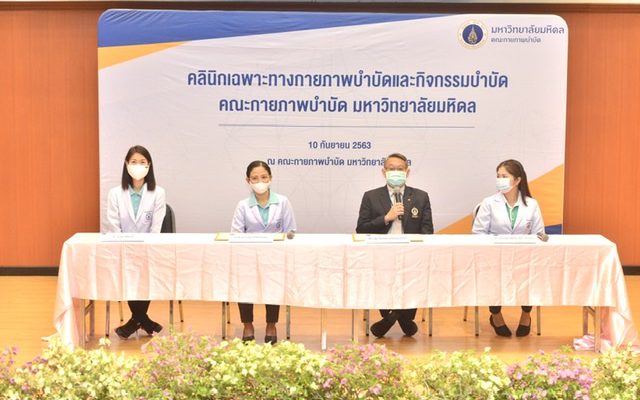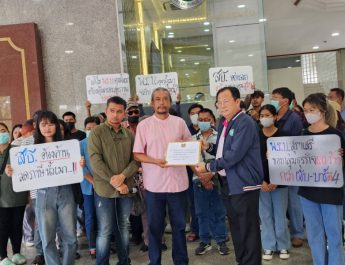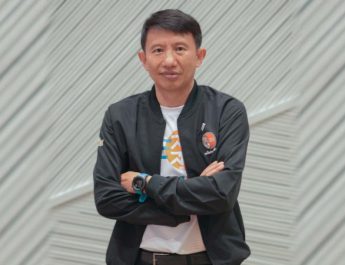ครั้งแรกในเอเชียอาคเนย์ ศูนย์กายภาพบำบัด คณะกายภาพบำบัด ม.มหิดล เปิดคลินิกเฉพาะทางกายภาพบำบัด กับการกระตุ้นผ่านกระโหลกศรีษะด้วย TMS
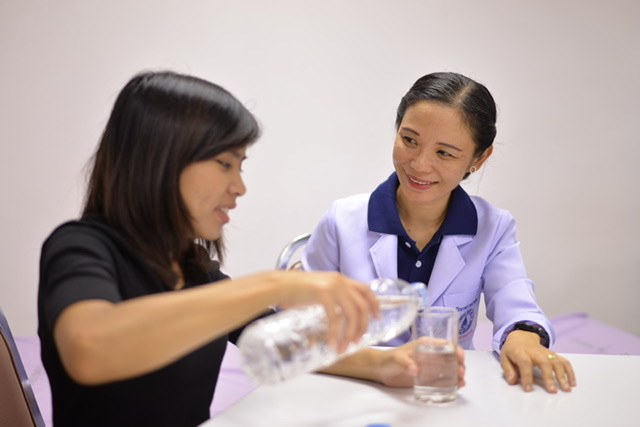
รู้หรือไม่ว่า ในบรรดาผู้ป่วยโรคหลอดเลือดสมองนั้น มีผู้ป่วยเพียง 5% เท่านั้นที่สามารถใช้แขนและมือในการเอื้อมหยิบจับของได้ใกล้เคียงปกติ สถิตินี้ชี้ให้เห็นถึงความจําเป็นในการคิดค้นกลยุทธ์เพื่อฝึกแขนและมือในผู้ป่วยกลุ่มนี้ เนื่องจากผู้ป่วยยังต้องการความช่วยเหลือจากผู้ดูแลในการดำรงชีวิตประจำวัน
คณะกายภาพบำบัดเล็งเห็นความสำคัญของปัญหาดังกล่าว ประกอบกับ คณะฯ มีองค์ความรู้เกี่ยวกับการทำกายภาพบำบัดที่เฉพาะเจาะจงที่เป็นหลักฐานเชิงประจักษ์และประสบการณ์เกี่ยวกับเครื่องมือ TMS หรือ Transcranial Magnetic Stimulation มากว่า 12 ปี จึงเห็นควรว่า การเปิดคลินิกกายภาพบำบัดเฉพาะทางร่วมกับการกระตุ้นสมอง TMS นั้นจะเป็นตัวช่วยหนึ่งที่จะทำให้การรักษาผู้ป่วยโรคหลอดเลือดสมองมีอาการที่ดีขึ้น และสามารถบูรณาการไปยังการเรียนการสอน และพัฒนางานวิจัยต่อไปในอนาคตในกลุ่มผู้ป่วยอื่นๆ เช่น พาร์กินสัน และออทิสซึม
องค์ความรู้ใหม่เกี่ยวกับชนิด ความหนักของการฝึก และตัวแปรต่างๆ ในการกระตุ้นสมอง ถูกถ่ายทอดจากห้องปฏิบัติการสู่รายวิชาต่างๆ ในหลักสูตรมหาบัณฑิตและดุษฎีบัณฑิต การบูรณาการวิจัยและการศึกษาแบบนี้เป็นวิธีส่งเสริมการศึกษาให้มีมาตรฐานระดับสากล โดยองค์ความรู้นั้นเป็นองค์ความรู้แบบมีหลักฐานเชิงประจักษ์
ในการรักษาทางกายภาพบำบัดด้วยเครื่องมือ TMS นั้น จะทำร่วมไปกับการรักษาทางกายภาพบำบัดด้วยเครื่องมือที่เรียกว่า Task specific training (TST) เทคนิคนี้เป็นเทคนิคการฝึกกิจกรรมที่จำเพาะกับอาการและปัญหาของผู้ป่วย โดย TST จะเป็นกิจกรรมการหยิบจับสิ่งของตามโจทย์ที่ได้รับ ซึ่งการรักษาในรูปแบบนี้จะช่วยลดความบกพร่องต่าง ๆ เพื่อเพิ่มศักยภาพในการเคลื่อนไหว ในการทำกิจกรรมต่างๆ ในชีวิตประจำวัน ร่วมทั้งเพิ่มแรงจูงใจในการฝึก โดยให้ผู้ป่วยมีส่วนร่วมในการแก้ไขปัญหา TMS เหมาะผู้ป่วยโรคหลอดเลือดสมอง ที่ไม่มีประวัติอาการชัก ไม่เคยถูกฝังโลหะในบริเวณที่กระตุ้น และไม่ได้ใส่เครื่องกระตุ้นหัวใจ (Pacemaker) การกระตุ้นด้วย
TMS ไม่มีอันตรายต่อระบบประสาทและร่างกาย อาจพบผลข้างเคียงเล็กน้อย เช่น รู้สึกไม่สบายบริเวณหนังศีรษะที่ได้รับการกระตุ้น เป็นต้น
ผู้สนใจเข้าใช้บริการการรักษาผ่านเครื่อง TMS สามารถติดตามรายละเอียดเพิ่มเติม ผ่านทางเว็ปไซต์: www.pt.mahidol.ac.th Facebook: ศูนย์กายภาพบำบัดมหาวิทยาลัยมหิดล หรือโทรสอบถามข้อมูลเพิ่มเติม พร้อมทั้งนัดหมายทำการรักษาได้ที่ 063-520-5151 กด 2 ฝ่ายประชาสัมพันธ์
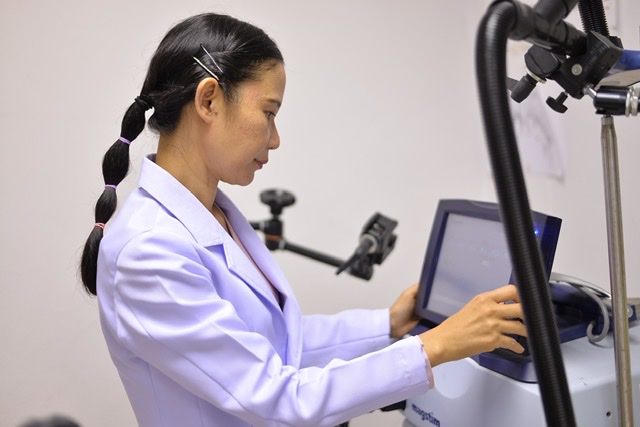
First of Southeast Asia – Transcranial Magnetic Stimulation: New intervention to augment upper extremity training after stroke.
Stroke is the leading cause of long-term disability worldwide. Therefore, it is critical to find optimal allocation of intervention that will reduce disability, lessen the societal burden, and provide a standardized evidence-based treatment. Limited recovery of upper extremity function including reach-to-grasp actions is one of the most disabling consequences of stroke. Among stroke survivors, only 5% regain full arm function. These statistics attest to the need for intervention strategies to promote upper extremity recovery. Transcranial Magnetic Stimulation (TMS) is a neuroimaging approach that allows non-invasive and painless brain stimulation in living humans. The repetitive TMS (rTMS) can restore an interhemispheric imbalance in stroke, thereby improve the paretic hand function. At the Faculty of Physical Therapy, Mahidol University, there have been series of clinical trials completed, continuing from generation to generation. We demonstrated that task-oriented training and repetitive training were augmented by rTMS in sub-acute and chronic stroke. The long-term effects of rTMS for stroke and applications for other neurological conditions, e.g. Parkinson’s disease and sport injuries are under way. The novel knowledge on type, intensity of motor training and the parameters of rTMS are transferred into numbers of classes in the master and doctoral programs. The research and academic integration is one of the strategies to strengthen the global-competent education, such that the classes teaching at graduate level are evidence-based content. This strategy leads to the sustainable body of knowledge that is transferred directly from laboratory to classroom.
ที่มา: โครงการวิจัยการกระตุ้นสมองผ่านกะโหลกศีรษะเพื่อส่งเสริมการฝึกแขนและมือผู้ป่วยโรคระบบประสาท โดย รศ.ดร.กภ.จารุกลู ตรีไตรลักษณะและคณะ สังกัดคณะกายภาพบําบัด มหาวิทยาลัยมหิดล By Assoc. Prof. Dr. Jarugool Tretriluxana, Faculty of Physical Therapy, Mahidol University

